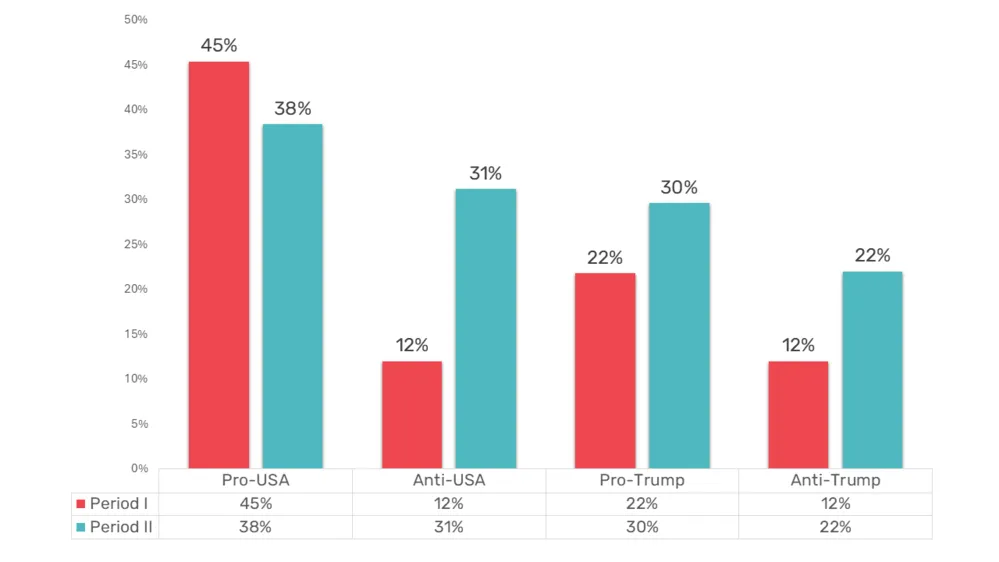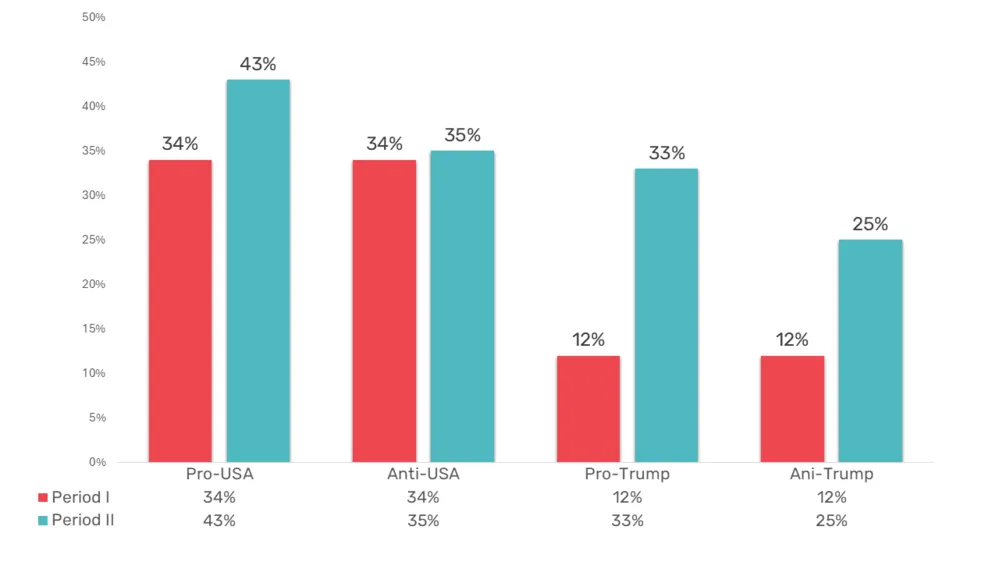In an age of digital media dominance, narratives shape not only public opinion but also international relations. The way a country is portrayed in the press can influence political decisions, foreign policy strategies, and even bilateral cooperation. This is especially true for the Western Balkans, where geopolitical dynamics are often deeply intertwined with historical experiences and national interests.
A recent analysis on geopolitical narratives conducted using Analytics.live, among other aspects, shows how the United States is portrayed in media across the region. The research monitored over 1,051 media outlets and analyzed approximately 7.6 million articles to uncover prevailing narratives, sentiment trends, and shifts in public discourse.
By tracking the most read, shared, and discussed articles, we identified key patterns in how different countries perceive the U.S. as a strategic partner. The results reveal a clear contrast between North Macedonia, where the media maintains a generally pro-American stance, and Serbia, where skepticism but also more positive shifts dominate coverage.
Tracking Media Narratives Over Time
To understand how perceptions evolved, the study focused on media coverage published between July 1, 2024, and February 20, 2025—a period marked by significant geopolitical events. This timeframe was divided into two phases: a pre-Trump period (from July 2024 to January 19, 2025) and a post-Trump period (from January 20 to February 20, 2025).
The key moment defining this division was Donald Trump’s return to the U.S. presidency on January 20, 2025. Given Trump’s controversial global reputation and distinct approach to foreign policy, we aimed to assess how his re-election influenced regional narratives. Would his return reinforce pro-American sentiment in some countries? Would it further alienate others? The results offer a fascinating glimpse into the shifting dynamics of U.S.-Balkan relations.
North Macedonia: A Strong Ally, With a Growing Trump Fascination
Throughout the monitoring period, North Macedonian media overwhelmingly portrayed the U.S. in a positive lightb but also showing more sceptical narratives towards. Many articles emphasized Washington’s support for regional stability, particularly regarding North Macedonia’s NATO and EU aspirations. The Prespa Agreement, which resolved the long-standing name dispute with Greece and opened the door for Euro-Atlantic integration, was frequently cited as an example of successful U.S. diplomacy in the region.
However, even before Trump officially returned to office, Macedonian media exhibited a growing interest in him as a political figure. Some outlets mirrored rhetoric seen in U.S. conservative circles, suggesting that Trump’s leadership style resonated with certain political factions in the country. After January 20, 2025, this interest intensified. Instead of broadly discussing U.S.-Macedonian relations, the media began personalizing the discourse around Trump himself. Would he continue supporting the region? Would his administration prioritize North Macedonia’s strategic interests?
This shift in focus had an interesting effect. While pro-American sentiment remained strong, it became increasingly conditional—tied directly to Trump’s actions rather than the U.S. as an country. Some articles praised his foreign policy stance, anticipating a more transactional but potentially beneficial approach to North Macedonia. Others voiced concerns that Trump’s unpredictable leadership could destabilize previous U.S. commitments in the Balkans.

Chart 1: Narratives in Macedonian Media, period I 01.07.2024-19.01.2025 and period II 20.01.-20.02.2025
Serbia: A Shift Toward More Positive U.S. Coverage, Driven by Trump’s Return
In contrast, Serbian media shows more skeptical and often outright hostile picture of the U.S. Unlike in North Macedonia, where positive narratives dominated, coverage in Serbia was polarized and deeply influenced by historical grievances.
Interestingly, pro-American narratives in Serbia increased from 34% to 43% post-Trump, though anti-American sentiment remained stable (34% to 35%), reflecting a divided media environment. This uptick in favorable narratives may seem surprising, but a closer look reveals it is less about the U.S. as a whole and more about Trump himself.
Pro-Trump content jumped from 12% to 33%, while anti-Trump coverage also rose, from 12% to 25%. Serbian media appeared to resonate with Trump’s anti-establishment rhetoric and nationalist undertones, even if distrust toward the U.S. as a state actor persisted.
However Serbian skepticism toward America is not tied to a particular administration but rather a deep-rooted distrust of U.S. influence in the region as a whole. Regardless of whether the White House is led by a Democrat or a Republican, much of the Serbian media landscape frames U.S. involvement as self-serving and potentially harmful to national interests.

Chart 2: Narratives in Serbian Media, period I 01.07.2024-19.01.2025 and period II 20.01.-20.02.2025
Why Media Narratives Matter
Media narratives are more than just words on a screen. They shape how people perceive international allies, influence government policies, and even impact diplomatic relations. The contrasting portrayals of the U.S. in North Macedonia and Serbia illustrate how deeply historical experiences, political alignments, and leadership changes affect public discourse.
In North Macedonia, where the U.S. has played a critical role in political stability and Euro-Atlantic integration, media coverage remains largely positive. However, Trump’s return has introduced a new layer of complexity, shifting attention away from broader U.S.-Macedonian relations and toward Trump’s specific role in shaping them.
In Serbia, the situation is markedly different. Skepticism toward the U.S. is longstanding but it may change because of a new administration. The results suggest that Serbian distrust of America is not about who is in power but rather a broader geopolitical stance—one that sees Washington as a force that must be approached with caution, if not outright resistance.
As global politics continue to evolve, so too will these narratives. Whether Trump’s policies reinforce these trends or challenge them remains to be seen. What is clear, however, is that the U.S. continues to be a highly influential and deeply debated actor in the Western Balkans, shaping regional discourse in ways that go far beyond traditional diplomacy.
Written by
Natasha Dimova
April 07, 2025